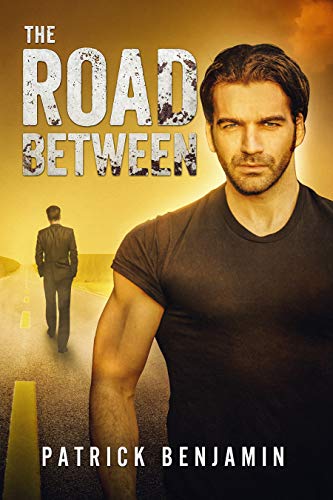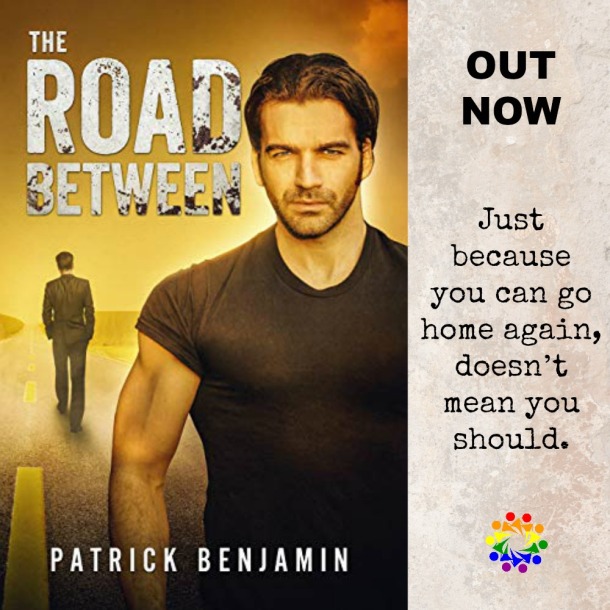RELEASE BLITZ

Book Title: The Road Between
Author: Patrick Benjamin
Publisher: Self-Published
Cover Artist: Rebecca Covers
Release Date: December 31, 2019
Genre/s: Contemporary M/M Romance, Family Drama
Trope/s: Friends to lovers, Dysfunctional Families
Themes: Forgiveness, self-discovery, secrets & lies
Heat Rating: 4 flames
Length: 93 000 words/ 281 pages
It is a standalone story.

Just because you can go home again, doesn’t mean you should.
Blurb
Television personality, Parker Houston has spent a lifetime following that motto: Running away at seventeen and vowing never to return to the small country town that made growing up gay, practically unbearable. But when the death of a loved one forces him home for the first time in twenty years, Parker has to reconcile the life and the people he left behind. Unearthing secrets and conflicts long buried.
While trying to mend the fractured relationships within his complicated family, Parker meets Bryce, a cocky rancher with a womanizing past. And although the friendship seems unlikely, neither man can deny the explosion they feel when their two worlds collide.
Excerpt
Prologue
Twenty years since I'd left.
Camouflaged by a thick perimeter of poplar trees, you would miss it if you blinked. Even travelling ten clicks under the speed limit. Buried at the bottom of a steep valley, River Bluff was accessible only by a narrow gravel road. So unremarkable and insignificant, that if you didn't know it was there, you wouldn't have found it. At the base of the way was a single sign, "Welcome to River Bluff, Home of The Grouch".
Every August, the town held a contest. Townsfolk nominated the rudest, most inconsiderate and overall "grouchy" members of the community. They declared the person with the most nominations "The Grouch". For the next year, the winner attended every community event, with an excuse to be rude to everyone in their path. The Grouch participated in every social event — everything from the annual chili cook-off to high school graduation. The title was quite a big deal. As a child, the message was completely lost on me. Now, as an adult, I recognize how bizarre it was for a town to take pride in their unpleasantness. In many ways, River Bluff was a strange place. On the surface, it and its residents seemed utterly safe. Underneath, things were perilous.
Everyone knew each other and each other's business. Everyone loved each other, yet no one could stand each other. If you were struggling, people would arrive at your door to offer you small scraps of their wealth. If you were successful, even more people would arrive at your door, demanding their cut. The entire community walked a thin line between socialist and militant. If an outsider had a conflict with a resident, the town would band together. They would pick-up their pitchforks to drive away the unwelcome beast. The same was true for any resident who challenged traditional thinking or practices. One could best compare the town mentality to a cult. Either you were one of the faithful, or you were an unwanted skeptic.
In River Bluff, belonging or not belonging was a concept as basic as age. There were only a few roles in which to fit. Boys were football players and girls were cheerleaders. Men worked on farms or in the oil field. Women stayed at home or worked in the town's restaurants and bakeries. Of course, there were a few exceptions. Educators and physicians could be either male or female, but those positions came with their own sets of challenges. They required a degree. Once you left River Bluff to pursue one, you were seldom welcomed back without scrutiny. In fact, to my recollection, not a single teacher from my youth had been an original resident. They had been transplants from larger cities. Fresh out of university, with no choice but to take a position in a town no tenured educator would accept. For most of us, only a few specific roles were acceptable. That left little room for individuality.
I was aware of this truth whenever I would play dolls with Tanya Caldwell from across the street. Or whenever my mother would catch me reading "Nancy Drew" rather than "The Hardy Boys". Or whenever I skipped football tryouts to audition for a school play. Or when I received the awkward looks of judgment from children and adults alike. That felt constant. They realized early, as did I, that I was not one of them. I did not belong. I did not behave, think, speak or even walk like them. I was different. Alien. It was that simple.
I was six years old when people first began to see me in this way. I was eight years old when I started to notice for myself. I was in the third grade, and our teacher had given us all an easy assignment. We were to present to the class a report about what we wanted to be when we grew up. Most of the kids spoke about their parents or other members of their family who inspired them. Brandon Jones wanted to be a mechanic like his father. Stacey Zimmerman wished to use her grandmother's pie recipes to open a bakery. Jonathan Wilkins planned to take over his grandfather's farm. Tamara Lane's greatest ambition was to be a mother. I wish my aspiration had been so simple. It wasn't. When the teacher called my name, I skipped to the front of the room and proclaimed that I wanted to be Oprah Winfrey.
I realize now how absurd a life goal that must have been to a group of children, especially a group of children with such rational and regular goals. I also realize now, how hilarious it was for a skinny white boy to declare that he wanted to be a strong woman of colour. At the time, it had been the truth. Well, almost the truth. I didn't want to be Oprah. Instead, I wanted to be like Oprah - which was a notion I could have articulated better. I wanted a job in television. Doing what, I wasn't sure, but I knew I wanted to be somebody special. I wanted success and fame. I wanted love and admiration. I wanted to be a household name, and in 1989, there was no more prominent household name than Oprah Winfrey. So, in my eight-year-old mind, I wanted to be Oprah. This proclamation acted as the catalyst for the decade of torment that followed.
I soon realized that "different" meant unwelcome. It started naturally enough, with innocent pointing, stares and laughter. Other small torments evolved from there. One boy learned how to make 'spitballs' from his older brother. Soon all the boys in the class had hollowed-out pens and shredded pieces of paper. Walking the halls became like storming the beaches of Normandy. I endured whatever shots they fired at me. Some days I would get home from school only to discover that the back of my shirt looked like a papier-mâché project.
By Junior High, things had escalated to acts of violence and vandalism. Another, far more offensive term also replaced my name -- Faggot. It was the early nineties, so few teachers took issue with the slur. Few of my teachers took issue with anything other students did to me. One January day, someone broke into my gym locker during Phys-Ed and defecated on my jeans and sweater. Nobody batted an eye. I spent the rest of that frigid day in my sweaty gym clothes and walked home with bare legs. When I arrived home, my father had been so furious with me for "allowing" myself "to be a victim" that he blackened my eye. Then he forced me to launder my soiled clothes by hand, in the bathroom sink.
Robert Houston was a proud man, strong and quick to anger. He despised weakness and strived to purge it from me thoroughly. By force if necessary. One summer, I had woke to find the word 'Fag' spray-painted, in several places, on my brand-new mountain bike. I didn't want my father to know that I was a victim, once again. So, I spent my allowance on a can of black house paint and used it to cover the graffiti. House paint is not intended for aluminum. He saw it and raged.
"How could you destroy a two-hundred-dollar bicycle?!" He demanded, furiously removing his belt. He proceeded to lash me all over my body; across my arms, my back, my legs, even my face. He was often unpredictable in his anger. I never really knew what would set him off or if the severity of punishment would suit the crime committed. It was during those long, summer months at home that I counted the days until the fall semester would begin. I preferred the Devil I knew and could predict.
By senior year, I realized that I was not alone in my exile. Of course, there were others like me, whose differences made them easy targets. I could see them getting shoved into their lockers. I could hear the profanities being slung at them. And they, in turn, bore witness to my struggle. Even though we rarely spoke to each other, we were a brotherhood. We were bound together by our shared experiences and common enemies.
Most outsiders strived for a life of anonymity and blending in. I did not. I grew independent and opinionated. I knew that nothing I could say or do could put me lower on the social hierarchy, and that gave me strength. I decided that if I had to be on the bottom, I would make sure they could hear me at the top. I spoke up, and I spoke out. I drew attention to the town's lack of gender-neutral youth programs. I rallied for the creation of a peer support presence in our school and a plethora of other causes. The protest against pickled beets in the cafeteria had been a personal victory for me. I argued often and hard and realized I was good at it. I served as captain of the debate team, which was where I felt my most authentic and brave.
I had planted in myself, a seed of success. If it had any hope of blossoming, I knew I had to get out of River Bluff. I had to nurture my individuality and empower my spirit. I was raring to experience the world beyond. So, two days after graduation, I loaded a single suitcase onto a Greyhound bus, Toronto bound. I didn't leave a note, and I never looked back.
Until now.
Twenty years later.

About the Author
Patrick Benjamin has always had a passion for books. Growing up in rural Alberta, Canada, books were often the only escape he had from his simple small-town life. Patrick loves the way books can transport readers into different worlds and times, and expose them to experiences and types of people they wouldn't normally encounter. His favourite stories, have always been those with strong, relatable characters. Stories that refrain from painting their characters with perfect brush strokes, and instead present their characters as fully rounded, real people -- complete with their own imperfections, humours and motivations. Those are the types of Characters he aims to create, and its their stories he wants to tell. This is his first novel.



No comments:
Post a Comment